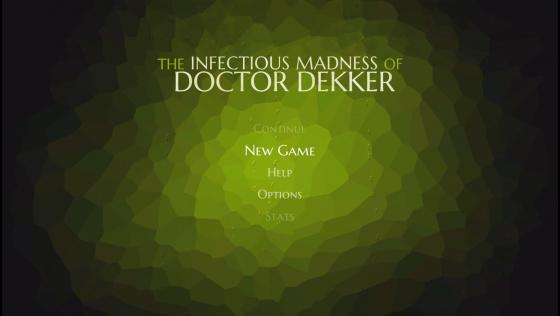
Everygamegoing
 25th September 2022
25th September 2022
Categories: Review: Software
Author: Dave E
Publisher: Limited Run Games
Machine: PlayStation 4 (US Version)
The Infectious Madness Of Doctor Dekker
When I was about fifteen, a new type of arcade machine started to appear in motorway service stations and arcade halls. A technology called FMV, Full Motion Video, had come to town, and it had games like Mad Dog McCree, a sort of B-movie western which 'branched' depending on where you aimed your crosshair and pressed fire. The games were more expensive to play than the basic cabinets, and they were much less reactive. I only played Mad Dog McCree a few times before I concluded it wasn't as much fun as Operation Wolf.
FMV was not done though - a few years later there were machines like the Philips cd-i and the Panasonic 3DO trying to convince us all that interactive movies were the next 'big thing'. But, well, it wasn't. With titles ranging from the diabolical Plumbers Don't Wear Ties through to the substandard Night Trap, the format failed mainly through its total lack of any replay value. The games were like movies - and not very good movies, natch! - and, once you'd played them through, they seldom tempted you back.
It's only recently, with the advent of systems like the PS4, that you can actually envision FMV finally working. With the budget of a Hollywood movie, and with a lot of careful thought and planning, you could get some Hollywood A-Listers involved in something that might "fuse" a game and a movie so expertly that it would have replay value. Recently I played a PS4 FMV game that tried to do just that - Erica - and now I've picked up a copy of The Infectious Madness Of Doctor Dekker, which is also an FMV game. I have to admit that both were head and shoulders above Mad Dog McCree, Plumbers and Night Trap. Alas, the FMV format still seems more of a curiosity than something that's really going to turn heads. I always respect any game that dares to do something completely different though, and Doctor Dekker is nothing if not different.

The scenario is as follows: You are a psychiatrist who has been drafted in at short notice to Dr. Dekker's practice. Dr. Dekker, you see, was recently murdered, stabbed through the heart with one of those paper spikes (i.e. one of those ornamental spikes that doctors and lawyers would use to spear parking tickets and expense receipts). Such an unusual murder weapon points to someone not having planned his murder in advance but having reached for the nearest thing to hand to kill him with. The police also cannot find his prescription pad either, and so, naturally enough, suspicion has fallen upon one or more of the patients Dr. Dekker was treating. It's your job to take over the practice, listen to the patients, and try and work out who was responsible for the murder. A playthrough weighs in about five hours in length, so there's a lot of dialogue to listen to. Unfortunately, much of it is totally meaningless.
Firstly, credit where it's due to D'Avekki Studios for producing a game which builds tension. As the game uses real actors and actresses, and as it all takes place from your point of view and with each patient sitting on a therapist's couch, it would have been very easy for this to have come out like an overlong version of Alan Bennett's Talking Heads monologues. It doesn't because the camerawork is incredibly nifty, with lots of zooms, jumps, slow zooms and close-ups. This also has the incredibly useful side-effect of disguising any clumsy jumps between the response to one question to that of another. Secondly, all of the potential suspects are completely bonkers, and I have to confess somewhat terrifying. There's Nathan, who's convinced he's been replaying the same day over and over again since the death of his fiancée in a car accident. There's Marianna, who's impossibly sexy but stabbed her last one-night-stand to death as he slept next to her in bed. There's Claire, who murdered her husband David but claims she has brought him back to life and now lives with him in a place she calls the "lakehouse". There's Bryce, who digs graves for a living and claims that, for him, time stops every night at midnight and he can spend an hour walking among all the "frozen" people and take photos of them with no clothes on. There's Elin, who claims she can 'shift' (transform) into any other living person at will, and uses her talents in a local hospice to allow those at death's door to speak to any relatives who cannot be by their side at the end. And finally there's Dekker's all-too-chirpy assistant, Jaya, who keeps telling you you look more and more wretched by the hour.
You play the game by talking to each suspect, selecting one from a selection of possible questions on the left of the screen, or you enter a question of your own. You get an instant reaction when you pose a question, and can ask away until the questions disappear and you get the message 'Maybe you should talk to someone else'. The game is broken down into five individual acts, and you get the impression that a week or two has elapsed between sessions, although it's not 100% clear. At the end of act five, you must accuse whoever you think murdered your predecessor and, if you get it right, presumably you get to call the police and tell them you've done their job for them and they'll take the guilty man or woman from one secure hospital to another. Victory of sorts, I suppose.

Alas, although it's a fascinating premise, it all starts falling apart pretty quickly. Firstly, to use a theatrical expression, the actors 'ham up' their parts. Secondly, they are playing people with mental illnesses and personality disorders, so the stories they are telling you are divorced from any semblance of objective reality. To give you just some idea of their wild delusions, in addition to what I've already mentioned, they will tell you they can teleport, that they can reanimate corpses and that they are feeding people to a creature who lives at the bottom of the sea. You're trying to deduce who may be a murderer from a sea of admitted murderers. And even those who don't seem to be murderers are, at best, unreliable narrators. Even Hercule Poirot himself would have a great deal of difficulty untangling what happened from these kinds of testimonies. And what doesn't help at all is that the patients constantly ask you questions too, and the game refuses to move on until you've answered them. Marianna (the sexy one) keeps insisting you have already visited her at her house on many occasions and had a lot of fun "getting inside" her. But, although you can protest that no such liaisons have actually occurred, in the next breath you can agree to visit her at home if you wish... Cognitive dissonance, it seems, is not just limited to the patients in this game.
Indeed, it's very hard to trust anything about this game at all. The interrogations (for want of a better word) you can perform veer into side-streets that ultimately terminate in dead ends, eating up hours of your time for very little reason. For example, at one point, you're interested in alibis; later, you start obsessively focusing on the "referral letters" that led all these people to Dekker's practice in the first place. The trouble is that, in relation to establishing alibis, every suspect having at least one personality disorder makes it impossible to trust any alibi evidence they proffer. You might as well just guess as try to glean anything from their answers!
And... the more I learned about the suspects, the less trust I had in the game's central premise. My biggest issue was that all of the patients had a life outside of the sessions which they attended; even the ones that I learned were evidently extremely dangerous. It stretched my credibility beyond breaking point that the admitted murderers Claire (the one who murdered her husband) and Marianna (the one who murdered a man she picked up at a nightclub) were able to pop in and out of my sessions for an hour every fortnight, and seemingly live lives outside of them. Surely, I found myself thinking, we must all be in an asylum... and probably Jaya's a patient of that asylum too.

Ultimately, The Infectious Madness Of Doctor Dekker descends into hopeless confusion. By the final act, I was just guessing at who'd murdered Dekker and, as if to hammer home the point, I didn't guess the guilty party until I'd wrongly fingered each and every one of the other suspects!! There was then an epilogue which, if anything, just left me even more confused and... game over. And, in familiar FMV style, the games holds no interest at all unless, for some baffling reason, you feel like going through it all again.
And finally, to use another theatrical expression, I wonder whether D'Avekki Studios are familiar with "Chekhov's gun". Chekhov's gun is a literary device that states that if you put a gun in the background of Act One, then make sure you've fired it by the end of Act Five. Marianna spent hours telling me in great detail about how she would take off all her clothes and dance naked for me. And it never happened. So, on top of being confused, I feel cheated too.
Overall then, this game doesn't have a great deal to offer. For FMV fans only.
Other Reviews Of The Infectious Madness Of Doctor Dekker For The PlayStation 4 (US Version)
The Infectious Madness Of Doctor Dekker (D'Avekki Studios)
A review by Lindsay M (DigitallyDownloaded)



















